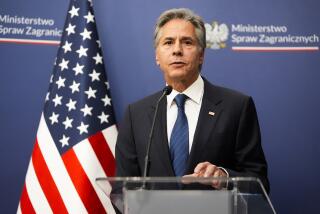Democracy Is Step One, Mr. Putin
- Share via
Then there were none. President Vladimir V. Putin exercised his self-described “dictatorship of the law” over the weekend to silence NTV, the only independent television network in Russia, and started dismantling its holding company, Media-Most. The yearlong assault on Media-Most, Putin insists, is a business matter between its founder, Vladimir A. Gusinsky, and the state-run gas monopoly, Gazprom, a part-owner and creditor. But few doubt that the Kremlin is orchestrating the campaign to destroy Russia’s most important source of independent journalism.
Harassment of media critics, intimidation, arbitrary closure of media outlets and confiscation of assets have all been used by Moscow to suppress criticism. Authorities raided NTV more than two dozen times last year on fraud charges that were never prosecuted. Gusinsky himself was briefly jailed in June and was freed only after he signed a secret deal with Gazprom and the Ministry of Information under which he would avoid prosecution if he turned his Media-Most holdings over to Gazprom. Gusinsky subsequently renounced the agreement and fled to Spain, where he has been fighting extradition ever since. In the meantime, NTV was taken over by Gazprom, the editorial staff of Media-Most’s weekly magazine Itogi--published in partnership with Newsweek--was sacked, and the daily Sevodnya (Today) was shut down.
The official charge against Gusinsky is that Media-Most’s assets fell below a required minimum, a situation common and tolerated in other Russian media companies--which are state-controlled or toe the official line. Gusinsky, like all the Russian oligarchs, knew how to fish in the murky waters of Russian business, but he became the target of the Kremlin’s wrath because of the open and often critical reporting by Media-Most outlets.
A recent report by parliamentarians of the Council of Europe found journalism to be one of the most dangerous professions in Russia. Kidnappings, imprisonment and murder are frequent, but seldom investigated or punished. Some 120 Russian journalists have been killed over the last decade. In one of the most appalling incidents, an editor of Novaya Gazeta was beaten to death last May, apparently mistaken for that newspaper’s investigative reporter, who was writing about corruption at Lukoil, Russia’s largest oil company. Kidnapping of journalists was Moscow’s weapon of choice in keeping the media out of Chechnya.
Dismemberment of an independent press poses a serious threat to democracy in Russia, and that should worry not only its European neighbors but the United States as well. The Council of Europe last year suspended Russia’s voting rights over the brutal war in Chechnya but, despite protest from human rights groups, restored Moscow’s status in January. It was a craven move of political appeasement that undermines the council’s own credibility.
Putin wants Russia to be an equal partner in the Group of 7, the organization of most-developed countries. President Bush and his G-7 counterparts should make it clear to him that without democracy, it doesn’t qualify.
More to Read
Sign up for Essential California
The most important California stories and recommendations in your inbox every morning.
You may occasionally receive promotional content from the Los Angeles Times.













